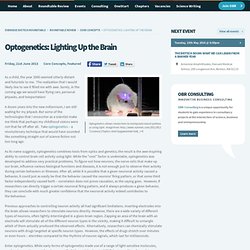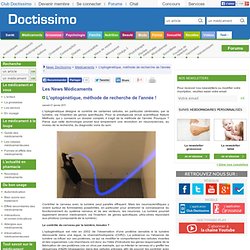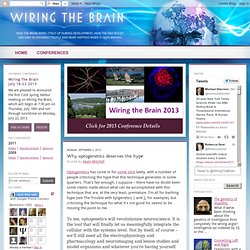

Avancées. Entreprises. OPINIÓN: La optogenética, una tecnología para 'controlar' el cerebro. Los antecedentes de la se remontan a 1979, cuando el ganador del Nobel, Francis Crick uno de los descubridores de la estructura del ADN, junto con James Watson y Rosalind Franklin— insinuaron que los neurocientíficos deberían intentar aprender a controlar células cerebrales específicas . Pues bien, eso ciertamente parecería un avance con gran potencial. Imagina ser capaz de encender o apagar desde afuera las neuronas en el cerebro de un animal. Sería parecido a transformar una criatura en un robot. Bbcd.bio.uniroma1.it/neuroscienzemolecolari/NBMPaperStudenti/Optogenetica,Michetti.pdf. Startups on the menu: Circuit Therapeutics : Nature Biotechnology. Coast Painting. 'Of Mice and Pain': Using light instead of pills a future possibility. Gero Miesenböck wins 2013 Brain Prize for optogenetics. Science | University 11 Mar 13 Professor Gero Miesenböck has been awarded The Brain Prize 2013 for his pioneering role in developing 'optogenetics', a revolutionary technique which uses light to control sets of nerve cells in order to reveal much about the brain.

Oxford University neuroscientists have now been named as winners in two out of the three years this major new prize has been awarded. Professor Péter Somogyi was a winner of the first Brain prize in 2011 for establishing methods for characterising nerve cell circuits in the brain, sharing the award with two others. Professor Miesenböck is Director of the Centre for Neural Circuits and Behaviour at the University of Oxford. Nmeth.f.326. Carlo Matteucci. Nmeth.f.325. Nmeth.f.327.
A trick of the light? Optogenetics Found to Revive Neuronal Activity. By Catherine Clarke, Account Coordinator, Alto Marketing – January 21st 2013 There’s no doubt that ‘science’ is a very broad term.

Encompassing physics, chemistry, life and materials science, to name just a few, it is unsurprising that most people choose a particular avenue of science to focus their attention on, albeit professionally or out of personal interest. At Alto Marketing, we pride ourselves on having a strong background in the life sciences, acting as a team to produce content across the diverse range of topics enveloped by the term, with key strengths in areas of genomics and drug discovery. I have always had personal interest in the science that underpins clinical conditions. Subsequently, it is the research and methodologies that are implemented in resolving our understanding and approach to these conditions that also attract my attention. Optogenetics: Lighting Up the Brain. Optogenetics allows researchers to manipulate neural pathways using light.

Image from: As a child, the year 2000 seemed utterly distant and futuristic to me. Bm06_Optogenetics-basetext. Fenno%20AnnRev%202011. Optogenetics: Controlling the Brain with Light [Extended Version] Despite the enormous efforts of clinicians and researchers, our limited insight into psychiatric disease (the worldwide-leading cause of years of life lost to death or disability) hinders the search for cures and contributes to stigmatization.
![Optogenetics: Controlling the Brain with Light [Extended Version]](http://cdn.pearltrees.com/s/pic/th/optogenetics-controlling-76254761)
Clearly, we need new answers in psychiatry. But as philosopher of science Karl Popper might have said, before we can find the answers, we need the power to ask new questions. In other words, we need new technology. Developing appropriate techniques is difficult, however, because the mammalian brain is beyond compare in its complexity. It is an intricate system in which tens of billions of intertwined neurons—with multitudinous distinct characteristics and wiring patterns—compute with precisely timed, millisecond-scale electrical signals, as well as with a rich diversity of biochemical messengers. Optogenetics is the combination of genetics and optics to control well-defined events within specific cells of living tissue. Related links: Contre.
Why “Optogenetic” Methods for Manipulating Brains Don’t Light Me Up** It’s the kind of scitech innovation that, when I was a bright-eyed young science writer, made me think, “Cool!”

But now stories like “OCD and Optogenetics: Lighting the brain up to shut a behavior down” bring out the curmudgeon in me. Does the trendy field of optogenetics deserve all its glowing coverage? The column, by my Scientific American co-blogger Scicurious, actually does a terrific job describing a recent advance in the fast-moving field of optogenetics. Optogenetics involves tweaking the genes of neurons so that they become sensitive to light. Researchers can then trigger or suppress firing by the neurons by stimulating them with light-emitting devices inserted into the brain. Définitions. Méthode of the Year / Nature. Nmeth.f.322. L'optogénétique, méthode de recherche de l'année ! - News Médicaments. L'optogénétique désigne le contrôle de certaines cellules, en particulier cérébrales, par la lumière, via l'insertion de gènes spécifiques.

Pour la prestigieuse revue scientifique Nature Methods, qui y consacre un dossier complet, il s'agit de la méthode de l'année. Pourquoi ? Parce que cette technologie promet tout simplement une révolution en neurosciences, au niveau de la recherche, du diagnostic voire du soin. Contrôler le cerveau avec la lumière peut paraître effrayant. Mais les neuroscientifiques y voient surtout de formidables possibilités, en particulier pour améliorer la connaissance du fonctionnement du système nerveux et de ses vecteurs, les neurones.
Le contrôle du cerveau par la lumière, kesako ? L'optogénétique est née en 2002 de l'observation d'une protéine sensible à la lumière découverte dans une algue, la channelrhodopsine (ChR2). Des expériences étonnantes menées sur une souris, une mouche et un ver Des souris parkinsoniennes traitées par la lumière bleue ! Optogénétique. Nmeth.f.323. Why optogenetics deserves the hype. Optogenetics has come in for some stick lately, with a number of people criticising the hype that this technique generates in some quarters.

That’s fair enough, I suppose – there have no doubt been some claims made about what can be accomplished with this technique that are, at the very least, premature. I’m all for bashing hype (see The Trouble with Epigenetics 1 and 2, for example), but criticising the technique for what it’s not good for seems to be missing the point to me. To me, optogenetics will revolutionise neuroscience. It is the tool that will finally let us meaningfully integrate the cellular with the systems level. Nmeth.f.324.